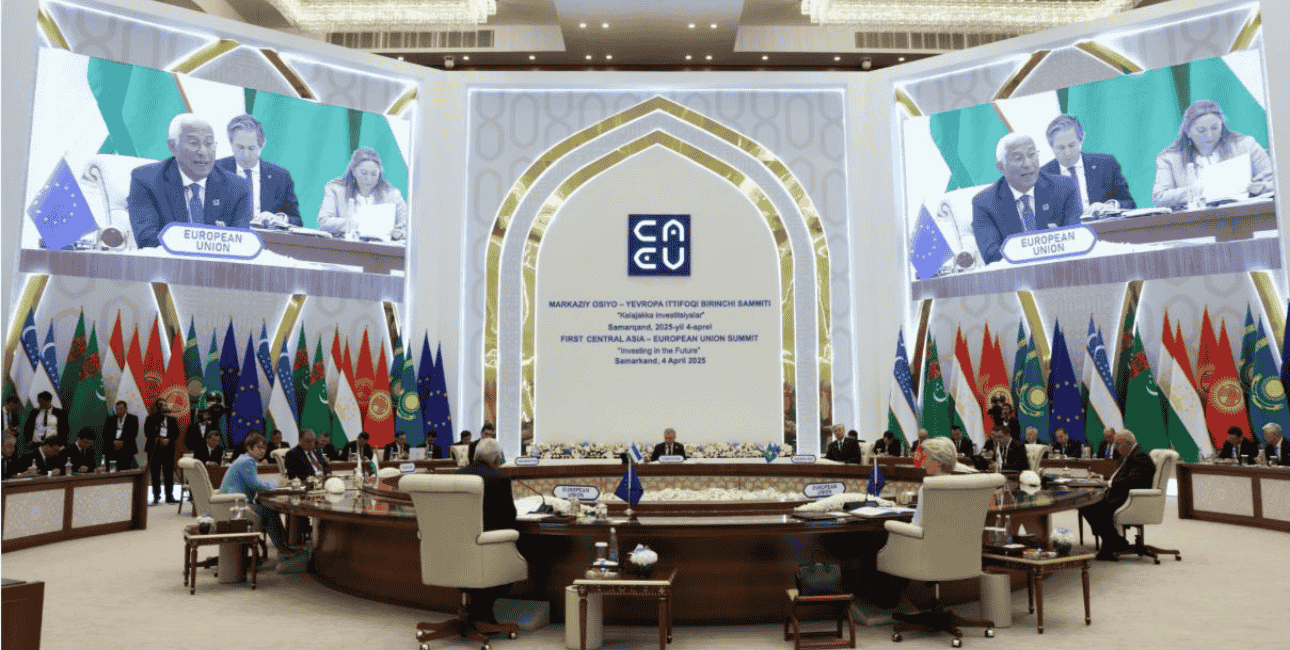In a major setback for Turkey, three Central Asian republics and members of the Organization of Turkic States (OTS), Kazakhstan, Turkmenistan, and Uzbekistan, have come out in support of Cyprus’s sovereignty, effectively ending Ankara’s efforts to use the OTS as a vehicle for recognition of the occupied north Cyprus.
In a joint declaration following the European Union-Central Asia summit in Samarkand on April 4, the three Central Asian nations explicitly endorsed UN Security Council resolutions 541 (1983) and 550 (1984), which condemn Turkey’s unilateral declaration of the so-called “Turkish Republic of Northern Cyprus” (TRNC) in 1983 and call on the UN members not to recognize it.
The declaration states: “We reaffirmed our strong commitment to the relevant UNSC Resolution 541(1983) and 550 (1984). We emphasized that engagement in regional cooperation frameworks should fully respect these international principles, which remain essential to the enhancement of EU-Central Asia relations.”
The UN Security Council adopted Resolution 541 on November 18, 1983. It called on all States to “respect the sovereignty, independence, territorial integrity, and non-alignment of the Republic of Cyprus” and not to recognize any other government of the island except the government of the Republic of Cyprus.
Resolution 550, adopted on 11 May 1984, condemned the illegal secessionist activities in the Turkish-occupied part of Cyprus and called on other member states not to recognize the illegal northern entity.

Moreover, a few days later, Kazakhstan, Uzbekistan, and Turkmenistan also appointed ambassadors to the Republic of Cyprus, effectively providing diplomatic recognition to the Republic of Cyprus.
This sudden and unexpected geopolitical realignment by the three Central Asian countries marks an end to Turkey’s two-year push for these nations to recognize the self-proclaimed “Turkish Republic of Northern Cyprus” (TRNC).
Kazakhstan and Uzbekistan, along with Turkey, Azerbaijan, and Kyrgyzstan, are members of the Organization of Turkic States (OTS), while Hungary, Turkmenistan, and the unrecognized occupied north of Cyprus have observer status.
Tectonic Shifts In Central Asian Geopolitics
Most Central Asian countries have deep linguistic, ethnic, and cultural connections with Turkey. For centuries, these countries were part of the former Ottoman Empire and were closely aligned with Istanbul.
In the 19th century, as Imperial Russia expanded southwards in Central Asia, these countries gradually came under the influence of Tsarist Russia. Following Turkey’s defeat in the First World War, the end of the Ottoman Empire, and the Bolshevik revolution in Russia in 1917, these countries joined the Soviet Union.
However, following the dissolution of the Soviet Union in 1991, these autonomous republics within the Soviet Union declared independence.
Because of this history, Russia and Turkey have a strong influence in the region. In the 21st century, China emerged as a new player in this region. China’s interests were multi-fold. Beijing wanted to utilize the enormous natural resources of this region for its industries and tap the vast hydrocarbon potential of Central Asia to satisfy its ever-expanding energy needs.
Beijing also wanted to leverage the geostrategic location of these countries on the crossroads between Asia and Europe for its ambitious Belt and Road Initiative (BRI). Central Asia is a key region for the success of China’s USD 1.75 trillion BRI project.
Turkey, Russia, and China also established multilateral platforms to enhance their diplomatic influence in Central Asia.
Russia established the Commonwealth of Independent States (CIS) in 1991, a loose grouping of 12 former Soviet Republics, including the Central Asian countries of Kazakhstan, Kyrgyzstan, Tajikistan, Turkmenistan, and Uzbekistan.
China established the Shanghai Cooperation Organization (SCO) in 2001 with Russia and the Central Asian countries of Kazakhstan, Kyrgyzstan, Tajikistan, and Uzbekistan. The organization currently has 10 members.
Turkey established the Organization of Turkic States in 2009 to promote cooperation among Turkic-speaking countries. It comprises five member states: Azerbaijan, Kazakhstan, Kyrgyzstan, Türkiye, and Uzbekistan. Observer status is granted to Turkmenistan, Hungary, and the Turkish Republic of Northern Cyprus.
The EU is a relatively new player in Central Asian geopolitics. Following the Russia-Ukraine war and US President Donald Trump’s return to the White House, the EU is trying to formulate an independent foreign policy to counter Russia and China’s rising influence and accommodate the US’s strategic withdrawal from Europe.
The EU-Central Asia summit earlier this month was the first significant step in that direction. During the summit, the EU committed 12 billion euros (US$13.6 billion) in investment in Central Asian infrastructure.
The decision by Kazakhstan, Turkmenistan, and Uzbekistan (all members of the OTS) to pledge support for Cyprus’s sovereignty is a significant diplomatic victory for the EU and a major hiccup for Turkey.
Setback For Erdogan’s Pan-Turkism
The move by these three countries is also read as a personal setback for Turkish President Recep Tayyip Erdoğan, who has invested considerable time and energy in the OTS.
Erdogan hoped to use Turkey’s linguistic and ethnic ties with these Central Asian countries to present Turkey and himself as the sole spokesperson for all Turkic-speaking countries in the world. Ankara also hoped to use OTS to advance the cause of diplomatic recognition for the TRNC.
With this aim, the TRNC was given observer status in the OTS in 2022, a privilege reserved only for sovereign, independent states.
It is worth noting that when the TRNC was given observer status in OTS in November 2022, the then secretary-general of the OTS, Kubanychbek Omuraliev, said this was “a message to the world.”
Now, as Kazakhstan, Turkmenistan, and Uzbekistan pledge support for Cyprus’s sovereignty, Turkey’s two-year-long effort to use OTS as a vehicle for the TRNC’s international recognition has come to an end.
Turkish Media Lambasts Erdogan
Predictably, the move is described as a big failure in the Turkish media.
Turkish newspaper Cumhuriyet ran the headline, “They sold the TRNC for 12 billion euros,” alleging that the Central Asian states’ recognition of Cyprus was part of a barter deal with the European Union, which promised 12 billion euros in investments. The paper accused these nations of betraying Turkey and the Turkish Cypriot community.
Another media outlet, Birgun, was even more scathing, labeling the development a “double fiasco in two days,” linking it with a simultaneous military failure in Syria, where an Israeli attack on a Turkish base went unanswered.
For now, Turkey and Azerbaijan are the only two OTS countries that fully support the TRNC. However, Retired Vice Admiral Cem Gurdeniz, the architect of Turkey’s “Blue Homeland” doctrine, warned on Twitter that if Ankara does not take immediate steps, then Azerbaijan might follow suit, which would signal a “complete failure of Turkish diplomacy” in the region.
- Sumit Ahlawat has over a decade of experience in news media. He has worked with Press Trust of India, Times Now, Zee News, Economic Times, and Microsoft News. He holds a Master’s Degree in International Media and Modern History from The University of Sheffield, UK.
- He can be reached at ahlawat.sumit85 (at) gmail.com







